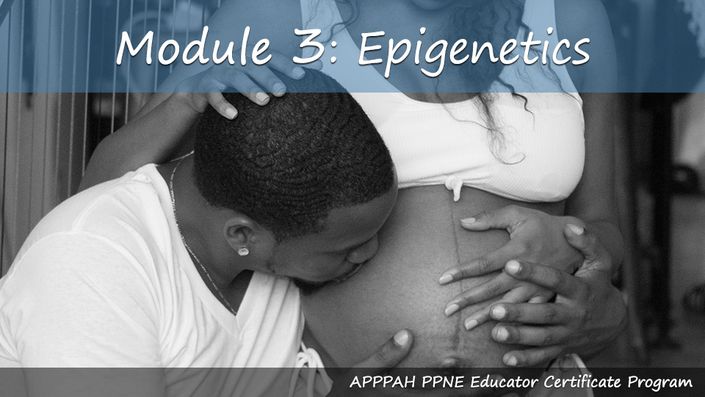
Module 3: Epigenetics
Prenatal Development & Epigenetics

Module 3: Prenatal Development & Epigenetics
Babies are emotional, intelligent, responsive, and show preference in utero as well as after birth. In addition, prenates are influenced by their maternal environment in utero and postnatal. This module presents the data that supports the sentience of babies in utero, introduces epigenetics and the nature versus nurture debate, and offers easy to read and understand research studies supporting the importance of the environment in prenatal parenting in particular.
Learning Objectives:
- Identify the 12 senses that babies develop inutero.
- Identify patterns of awareness and sentience in babies.
- Understand and be able to describe basic embryological development.
- Name early influences on cellular development and why they are important lifelong.
- Understand basic epigenetics and be able to explain why it is important in human development.
- Cite at least one study that supports the importance of pre- and perinatal psychology.
Includes work from David Chamberlain, Michel Odent, Liam Nisson, Thomas Verny, Bruce Lipton, articles on epigenetics, interviews with David Chamberlain, and documentary from NOVA and the BBC
Course Curriculum
-
StartWhat is epigenetics? - Carlos Guerrero-Bosagna
-
StartBabies Are Not What We Thought: Call for a New Paradigm
-
StartWomb ecology: New reasons and new ways to prepare the prenatal environment.
-
StartBehavioral Epigenetics: How Nurture Shapes Nature
-
StartBehavioral Epigenetics and Attachment
-
StartNature, Nurture, and The Power of Love
-
StartThe Biology of Belief (62 min. video)
-
StartThe Fetal Senses by David Chamberlain
-
StartBabies Know More Than You Think (60 min. video)
-
StartThe Mind of the Prenate (75 min. video)
-
StartModule 3 Comprehension Quiz
-
StartModule 3 Essay
-
StartBonus: How Trauma and Resilience Cross Generations
